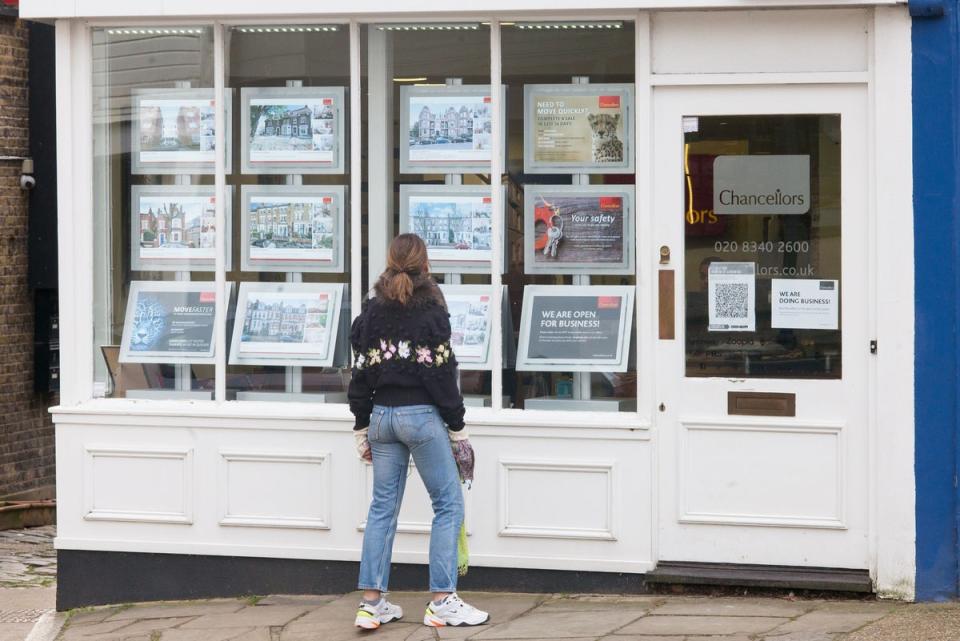Mortgage hammer blow of £5,000 a year for London homeowners

Thousands of London homeowners face an average £5,000-a-year mortgage shock, new analysis has revealed.
Data shows that borrowers on fixed-rate deals, who have so far been protected from the Bank of England’s repeated interest hikes, are set to be hit with a huge rise in costs as those products expire.
The research comes after the Bank’s monetary policy committee lifted rates again yesterday to four per cent — its highest level for 14 years. That meant immediate pain for homeowners with variable or tracker mortgages with around £72 added to the monthly costs on a typical £250,000 London mortgage. But for the estimated 250,000 people in London whose fixed rates expire in the coming months, the jump in costs could be even more severe.
According to the analysis, London will see the sharpest rise in mortgage costs as fixed-rate deals expire this year.
It found that of the top 20 areas in the country facing a hike in their monthly payments, 18 were in the capital. Kensington came top with an annual increase of £13,980 — more than £1,100 a month — while Chelsea and Fulham residents will see a rise of £11,480.
Shadow chancellor Rachel Reeves told the Standard: “The reality of the interest rate rise yesterday is families worried about making ends meet and people whose dreams of getting on the housing ladder have been shattered. With London seeing some of the highest mortgage hikes, many households across the capital will be anxious about what this means for their finances.”
The research by Labour compared a typical two-year mortgage on a fixed rate of 3.95 per cent in August 2022 — just before the chaos of Liz Truss’s mini-budget — with a typical two-year fix of 5.75 per cent this month. The regional average for London, the research said, was £5,090 a year or £416 a month.
The findings were echoed by the Building Societies Association, which said that nationally borrowers coming to the end of a two-year fix face a £200-a-month hike while those on five-year deals will be hit by a £160-a-month rise. However, average house prices in London are roughly twice what they are across the UK as a whole so the impact in the capital will be far higher.
Latest data from analysts Moneyfacts show average five-year fixes at around 5.2 per cent and two-year fixes averaging around 5.4 per cent.
Despite yesterday’s rise — the Bank’s 10th in a row — there are signs that interest rates might be nearing their peak, offering some respite to households being battered by the cost-of-living crisis. This morning the Bank’s chief economist Huw Pill said the Bank had shifted its language on interest rates amid expectations that it may have turned the corner in its battle with inflation.
Mr Pill told Times Radio: “Interest rates are not as high now and are not expected to go as high in part because inflation is lower but in part because the turmoil in markets last autumn has passed through the system. We have to recognise that we have done a lot with monetary policy already...There’s a lot of policy in the pipeline... the committee has changed its language, I think quite substantially.”
Although the benchmark CPI measure of inflation hit 10.5 per cent in December, Mr Pill added that he had a “reasonably high degree of confidence” that it will fall in the second half of the year. But with the Bank still forecasting a recession — albeit one that is shallower and shorter than feared — Prime Minister Rishi Sunak is still coming under pressure to boost growth.
Former PM Ms Truss, who was blamed for crashing the economy with unfunded tax cuts, is widely expected to launch a major intervention this weekend urging Mr Sunak to cut taxes.
As mortgage costs rise, there are growing fears that increasing numbers of homeowners will fall into arrears.
The head of City watchdog the Financial Conduct Authority has warned that 570,000 people in the UK could be at risk of payment shortfalls in the next two years.

 Yahoo Finance
Yahoo Finance 